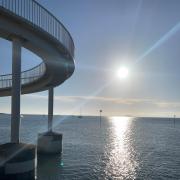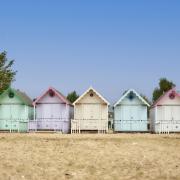When gyms closed during lockdown, holistic therapist Kellie Rogers looked for another way to exercise and enjoy nature more as a way to meditate. She began a daily swim in the waters of the Stour Estuary, and as the summer months waned, Kellie relished the challenge of a cold-water swim. She soon became known locally as the Manningtree Mermaid and it wasn’t long before people were asking to join her, and the Manningtree Mermaids were born.
‘I would offer to help to guide people with their breathing as they entered the cold water and created the group for safety purposes,’ she explains. ‘My intent was to swim for its health benefit and relax in nature, but to witness how it has brought people together is amazing. It’s created a beautiful community of fantastic people who also care about the environment.’
There are now 130 people in the Mermaids’ WhatsApp group. ‘Sometimes there may be up to 20 swimming at a time,’ she says. ‘Because it’s tidal, there’s only about two hours of high tide when we can swim. People get up at five in the morning, we have had group midnight swims and might squeeze one in at lunchtime. It’s such a healing experience and makes you feel great.’

‘It’s grown to this big movement,’ adds Helen Whitehead, 45, who moved from London to the area in 2020. ‘I pretty much started swimming with the group as soon as I moved here. Everyone is welcoming. It’s one of the best things in my life now, and I go every day I can from 5am in the morning to midnight.’
The experience changes throughout the year – from icy weather to sunny days. ‘Although it’s lovely weather now, I do really enjoy the very cold swims. In the summer you can stay in for a lot longer, whereas in winter you can probably only stay in a couple of minutes,’ says Helen.
The group of swimmers share the water with an array of wildlife with the occasional seal swimming alongside, geese flying low over the water just above their heads and every so often a moon jellyfish – although Helen describes the harmless creatures as ‘a bit gross’ saying, ‘You find yourself doing breaststroke and then coming into contact with a blob!’ However, despite the occasional blob, she describes the swims as idyllic. ‘It’s a special place,’ she adds.

The joy of wild swimming is multifaceted. Obviously, there is the exercise element, it's free and in an outdoor environment. But for Helen one of the most important things is the camaraderie. ‘For me especially, moving to a new area, it's been completely invaluable. I have met so many people and made some lifelong friendships, and it’s different people I might never have met before.
‘We’ve got mermaids from early 20s going up to mid 70s. There are people who swim with disabilities; one man walks with a cane, but in the water, he says he is free – and he’s a great swimmer. People come to swim from different backgrounds and upbringings: I work in the city, we have full-time mothers and we've got a lady who's in her 70s who says she ‘loves the endorphin rush after a cold swim’. We all swim together and have a brilliant time; it's lovely and how life should be.’
Swimmers get changed on the side of the beach and there’s the usual grappling with towels to hide one’s modesty. Helen says it’s a levelling experience. ‘You get to know each other very well,’ she laughs. I add that at minus-two degrees she must get changed very quickly. ‘You have to have a routine, especially if it’s cold. I get my gloves on first, then my socks.’ Although initially wary about having an extra obstacle in the water, the Stour Sailing Club has put hooks up on the Sailing Club wall for the swimmers, and in turn, the swimmers wear fluorescent floats so the sailors can look out for them.
Wild swimming, particularly in cold water, has been linked to many benefits including increased circulation, better immunity and improved mental health. Helen agrees, ‘Someone will say they have had a bad day at work, but when they come swimming, it all goes away. All your focus is on being in the water, everything else just kind of dissolves once you get in. Because of the cold, you have to breathe slowly so it's quite meditative, like yogic breathing. Otherwise, if it’s very cold you can hyper ventilate and lose your breath. Everyone says you never regret a swim – you forget everything else that's going on.’
Helen is part of a group spearheading a campaign, SWiM (Safe Water in Manningtree), to improve water quality – the goal is to stop pollution entering waterways and the group’s precious swimming areas. ‘The problem is we just don't know what pollution there is at the moment. We’ve got three combined sewer overflows (CSOs), which are upstream from us, and we're close to the Manningtree Water Recycling Centre.

‘Only one of these is monitored by Anglian Water, and monitoring only began in April 2022. As well as the CSOs, there is a pipe that releases treated effluent from the Water Recycling Centre, which should be safe to swim in. The CSOs should only be used as an emergency release if there has been lots of rain but the Environment Agency has said that water companies are discharging far too much. There could be an issue with not enough storage space; another problem may be an increase in houses using the system.’
The group is working with Surfers Against Sewage and led a protest day in April 2022 to highlight the problem. Helen describes the day with music and speakers as a ‘celebration of the Stour’.
It inspired the group to start focusing on what it could do to find out the state of the water at Manningtree beach – part of an Area of Outstanding Natural Beauty – and how to improve it. ‘We just don’t know how good the quality of our water is at the moment,’ says Helen.
Through the campaign we are applying for bathing water designation off Manningtree beach. If we get this designation, the Environment Agency will have to test the water on a weekly basis during the bathing season from May to September. If they find high levels of harmful bacteria, E coli and intestinal enterococci, they will have to find the source and whatever organisation is polluting the water will have a legal obligation to clear it up. It will mean swimmers will be taking their morning dip in cleaner water and it will protect the area for the next generation.’
Helen feels that water companies need to be held to account. Despite more than 400 coastal locations around the UK that have been given bathing water designation, only a handful of rivers are included. ‘We just need to know what they're doing and if they're doing it correctly. We’ve got the sailors involved, there's kayakers and paddleboarders. Manningtree beach is incredible. It’s a small beach but with funding from the council, we have a toy library, a sun cream dispenser and once a year some extra sand is deposited here.
‘There’s also a beach school where the local primary school spend a day each week. Kids are there all the time splashing around. It’s not just for swimmers but for everybody that uses the river. Everyone in Manningtree is passionate about making it the best it can be. The Stour is a precious resource, and we need to keep it that way.’



























